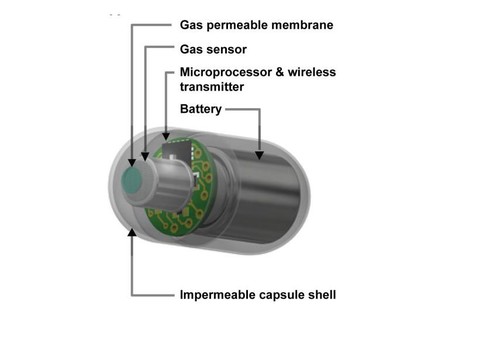Microbes outnumber the cells in the human gastrointestinal tract by 10 to one. Some of the organisms are essential for good health and some can be deadly. Kourosh Kalantar-zadeh, a professor of electrical and computer engineering at RMIT University in Melbourne, Australia, has developed a gas sensor capsule that can determine the microbial population of the gut by sensing the gases in the gut. The development was reported in the edition of the journal Trends in Biotechnology.
Every microbe that inhabits the human digestive system produces a unique set of gases. Some of these gases do not have an odor and some do. The device that the researchers developed is a capsule that is swallowed, passes through the entire digestive system, and collects data on the gases it encounters revealing the microbes that exist in each part of the gut. The data is wirelessly transmitted to a computer as the capsule passes through the gastrointestinal system.
The information that this device can deliver is far superior to present methods of microbe analysis. The device is so sensitive that it can detect the presence of even a few microbes that could indicate the potential for colon cancer, inflammatory bowel disease, and other diseases. The device can also determine the populations of beneficial microbes and indicate the need to change diet or take supplements to alter the beneficial microbe population to prevent disease.
The driving concept behind the gas sensor is the reduction of medical costs and an increase in the speed of disease diagnosis. The preset methods of assessing the microbial population of the gastrointestinal system are slow and inaccurate. The rate of movement of the capsule through the gut can be controlled externally so the time the patient and physician spend to get results is minimized.















